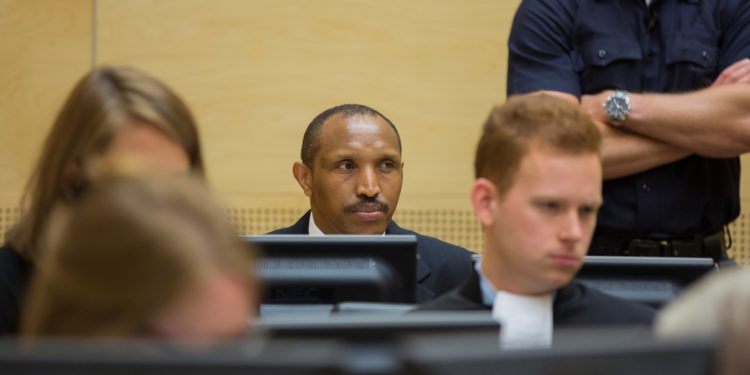Bosco Ntaganda’s defense at the International Criminal Court got off to a rocky start when judges rejected an application to file a no-case-to-answer motion on Monday, May 29, 2017. “Parties and participants are informed that the Chamber rejects the defense request for leave to file a no case to answer motion,” said presiding Judge Robert Fremr, adding: “A written decision will follow in due course.” Ntaganda is charged with 18 counts of war crimes and crimes against humanity allegedly committed in Ituri Province of the Democratic Republic of Congo in 2002 and 2003.
After Judge Fremr’s oral ruling, defense lawyer Stephane Bourgon made an opening statement additional to the one made in September 2015 highlighting the defense case, the loopholes in the prosecution’s case and how Ntaganda’s lawyers would address them. “I see the face of international criminal justice changing in this case,” Bourgon told the court. He said the court had never experienced a situation where the defense was putting up its case while there was a pending juridical issue whose decision it had sought to appeal. Defense lawyers had requested the chamber to stop the prosecution from monitoring and retrieving Ntaganda’s calls. Bourgon told the court that the prosecution has been trying to tarnish Ntaganda’s image by retrieving 4,500 telephone calls since his arrival at ICC and while in detention as he spoke to his friends and colleagues on how matters unfolded 10 years ago.
The prosecution has cast Ntaganda as an arrogant, brutal and vicious man whereas the defense team wants to paint him in a different light; as a charismatic man, a person ready to go on hunger strike for a cause he believes in, as a respectable man who voluntarily surrendered on March 2013 and a man humble enough to stand before the court for cross-examination. Ntaganda’s lawyers argue that the prosecution adopted an incomplete and selective approach, which failed to highlight the role of Uganda, Rwanda and the Democratic Republic of Congo in the crimes charged. They argue that the prosecution case is based on two attacks, relating to a definite time and geographical scope. The time element in the attacks is unlike the other crimes relating to the recruitment, enlistment and use of child soldiers and sexual slavery. Defense lawyers claim the prosecution failed to present evidence on the 2002/2003 ethnic conflict in Ituri region of DRC. Bourgon argued that an essential part of Ntaganda’s trial was skipped as the prosecution did not present any expert on military evidence and the defense would fill this void by presenting one.
Defense lawyers said the prosecution used unreliable information given by non-governmental organisations, based on rumours and unproven facts. Bourgon also raised questions about the evidence the prosecution had presented on exhumations and satellite imagery, saying the defense would show that the exhumation results did not match the prosecution’s case on alleged UPC attacks in the Kobu, Bambu and Lipri areas. Bourgon said Ntaganda contributed to minimizing the Ituri “conflict.” There were continuous attacks against the civilians and Ntaganda was trying to protect the population. “There was no widespread or systematic attacks against the civilians … We will present evidence that will convince you,” Bourgon said. The defense asserts that it would be hard for a witness to recall the exact way that events unfolded after 15 years.
Bourgon told the court that they will present audio-visual evidence and exhibits that were recorded when no one ever expected that there would be a trial. The defense lawyer said it was ironic that Ntaganda is facing charges of enlisting and conscripting child soldiers under 15 years of age even though no child soldier has testified in trial; no videos played drawing the attention of the chamber to where the child soldiers are. The defense said it would bridge the gap by providing a variety of images and videos. The first defense witness, Olivier Dekana, told the court he had travelled to the Union of Patriotic Congolese (UPC) training camp at Mandro at the beginning of the school holidays since he had been informed that soldiers were being trained and he was interested in joining. He said he had not heard about any age requirement for those receiving training at Mandro. Testifying in Kiswahili via video link, because he could not obtain travel documents to be physically present in The Hague, Dekana said he wanted to be trained since the Gigeri were under threat and Lupo di Group had attacked the residents of Goma, where he lived. On arrival at the Union of Patriotic Congolese (UPC) training camp, Dekana saw Commander Didi, Mogasi and his neighbour, Bosco Ntaganda at the veranda of the house. The witness was about 15 to 20 meters from where Ntaganda was when he saw him. “We are not training little children like you here,” Commander Didi and Mogasi told Witness D210 upon arrival at the camp. “You must go home.” The new recruits were scattered around Katoto and did not get into the city. The recruitment occurred in the evening and the witness could not tell clearly about the houses although it was near the centre. When questioned about the route the recruiters took, the witness said that he and the recruiters took different routes and he did not know the direction they went. Dekana’s testimony continues.







